| Srl | Item |
| 1 |
ID:
102567
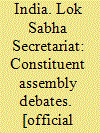

|
|
|
|
|
| Edition |
5th reprint
|
| Publication |
New Delhi, Lok Sabha Secretariat, 2009.
|
| Description |
Vol VII; p.
|
| Contents |
Vol. VII: (4 November 1948 to 8 January 1949)
|
|
|
|
|
|
|
|
|
|
|
|
Copies: C:1/I:0,R:1,Q:0
Circulation
| Accession# | Call# | Current Location | Status | Policy | Location |
| 055667 | 342.54029/IND 055667 | Main | On Shelf | Reference books | |
|
|
|
|
| 2 |
ID:
102569
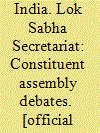

|
|
|
|
|
| Edition |
5th reprint
|
| Publication |
New Delhi, Lok Sabha Secretariat, 2009.
|
| Description |
Vol. viii; 961p.
|
| Contents |
Vol. VIII: 16 may 1949 to 16 June 1979
|
|
|
|
|
|
|
|
|
|
|
|
Copies: C:1/I:0,R:1,Q:0
Circulation
| Accession# | Call# | Current Location | Status | Policy | Location |
| 055668 | 342.54029/IND 055668 | Main | On Shelf | Reference books | |
|
|
|
|
| 3 |
ID:
102572
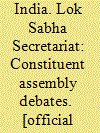

|
|
|
|
|
| Edition |
5th reprint
|
| Publication |
New Delhi, Lok Sabha Secretariat, 2009.
|
| Description |
Vol. ix; 1693p.
|
| Contents |
Vol. IX: 30 July 1949 to 18 September 1949
|
|
|
|
|
|
|
|
|
|
|
|
Copies: C:1/I:0,R:1,Q:0
Circulation
| Accession# | Call# | Current Location | Status | Policy | Location |
| 055669 | 342.54029/IND 055669 | Main | On Shelf | Reference books | |
|
|
|
|
| 4 |
ID:
175889
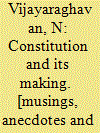

|
|
|
|
|
| Publication |
Haryana, OakBridge Publishing Pvt Ltd, 2021.
|
| Description |
xiv, 222p.Pbk
|
| Standard Number |
9789389176704
|
|
|
|
|
|
|
|
|
|
|
|
Copies: C:1/I:0,R:0,Q:0
Circulation
| Accession# | Call# | Current Location | Status | Policy | Location |
| 059920 | 342.54029/VIJ 059920 | Main | On Shelf | General | |
|
|
|
|
| 5 |
ID:
125272
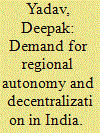

|
|
|
|
|
| Publication |
2013.
|
| Summary/Abstract |
The demand for regional autonomy has been a much debated issue in the Indian democracy for a long period of time. The question of to what extent regional units should be given freedom was discussed at length during Constituent Assembly debates as well .Article 1 of the Indian constitution declares "India that is Bharat shall be union of states". Indian union was established by incorporating basic features of both unitary and federal form of governments and thus, creating a federal form of government during peace time and converting it in to unitary one at the time of crisis. The success of Indian democracy has been a matter of great debate around the world and also a matter of great curiosity.
|
|
|
|
|
|
|
|
|
|
|
|
|
|
|
|
| 6 |
ID:
139091


|
|
|
|
|
| Summary/Abstract |
The strategic worldview of India’s political elite is typically described as having evolved in linear fashion. At the time of Independence there was ostensibly a broad consensus on the ends and means of diplomacy, which included peaceful co-existence and anti-imperialism on the one side, and non-alignment and non-violence on the other. This consensus, crafted by India’s first Prime Minister, Jawaharlal Nehru, is depicted as having steadily weakened over subsequent decades, eventually collapsing when diplomatic isolation and near bankruptcy toward the end of the Cold War compelled the adoption of a more pragmatic approach to foreign relations. The evidence does not support this narrative, however. Drawing on debates in the Constituent Assembly, this essay shows that from the outset there were voices, even inside the Congress Party, calling for realism in the conduct of international relations. Though Nehru’s dominant position meant that these critical voices were brushed aside at the time, recollecting them reveals that the realism that is said to have recently seeped into Indian foreign policy discussions is not a new development but rather the fruition of a long-standing critique.
|
|
|
|
|
|
|
|
|
|
|
|
|
|
|
|